
| Series: | Secret Country #3 |
| Publisher: | Firebird |
| Copyright: | 1989 |
| Printing: | 2003 |
| ISBN: | 0-14-250161-1 |
| Format: | Mass market |
| Pages: | 389 |
This is the third and concluding book in the trilogy starting with The Secret Country. Unsurprisingly, despite the false ending of The Hidden Land, the children are drawn back into their imaginary world and its concerns. Here, finally, the table is set, all the players have been introduced, knowledge of what's truly going on is now more widespread, and the characters face the third possible threat to the Hidden Land: the whim of the dragon.
So far in this series, I've been a bit dubious of the praise that it's gotten. I've liked it well enough to keep reading, and the background of protagonists who invented the world in which they find themselves is unique enough to warrant consideration. But it's been a bit more confusing than engrossing, the characters have been hard to like, and it hasn't grabbed me enough to rise to the level of praise I've heard about it.
That changes significantly in this book. The Whim of the Dragon improves considerably from not needing setup, initial exploration of background, and creation of mysteries. The guessing can finally stop and the revelations can begin, and they're more satisfying than I expected. Dean brings together the themes of responsibility and imagination, finally explains some of the strange voices that have populated previous books, and reveals more world-building that goes deeper than what the children invented. It's also more intense on action and events than the previous books, embedding the world analysis into more dynamic scenes and fewer allusive and half-explained conversations with Fence or Randolph.
I was thoroughly drawn into this book and could barely put it down. The Whim of the Dragon is partly adventure but mostly puzzle, a puzzle that benefits from the children bringing a different and outside perspective to the world and drawing and chasing connections in the way they would when they were creating it. The world seemed to come together in my mind as I read it, and the questions and answers about the metaphysics of the world felt like a cascade of significant, ongoing revelations. The first two books were slow at times, but they set up a lot and created a great effect for the conclusion.
Laura, sadly, never does get the moments of coming into her own that I was hoping she'd get throughout the series, although she does get less awkwardness and more of a role here. But both Ruth and Patrick improve considerably, particularly Ruth, who gets more focus and some lovely and difficult challenges to work through. Character growth throughout is handled well, neither too cliched nor too easy. And while I don't want to give away the ending, the way Dean handles the balance between the mundane world and the Secret Country surprised me a great deal and provided a touching and appropriate ending to the series.
Taken as a whole, this series echoes some things I've felt about the process of creating worlds and characters, which I suspect is part of the goal. An initial world, and an initial character, is often a conscious creation, put together along planned lines. But the best worlds and the best characters then start to change in the process of writing, evolve as they interact and encounter each other, and create a form of emergent complexity that feels like it's coming partly from outside one's mind even if it isn't. This series externalizes that feeling, turning it into a real experience for the children. It takes that rush of runaway creation and uses it to fuel the conflict of the story, and also plays with the sometimes-uncomfortable implications of being evil to one's characters in service of that story. It didn't take this quite as far at times as I wished it would, but it's the first series I can recall dealing directly with the idea without being excessively self-conscious and critical.
After the first two books, I wasn't sure I'd recommend this series, but given the conclusion, I definitely do. It's a good story, with extra appeal for people who think about the power of creation and imagination and who are familiar with the feeling that one's characters have a semi-independent existence.
Reviewed: 2010-08-21